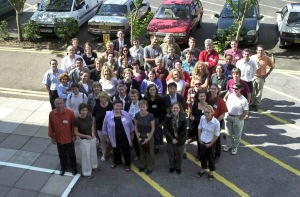 “Learning how to” rather than “learning about” was the keynote of the first Lexicom Workshop on Lexicography and Lexical Computing which took place at the Information Technology Research Institute, University of Brighton, England, from July 16-20, 2001. The focus of the tuition and practical work was twofold: the making of corpus-based dictionaries and the software that supports this activity.
“Learning how to” rather than “learning about” was the keynote of the first Lexicom Workshop on Lexicography and Lexical Computing which took place at the Information Technology Research Institute, University of Brighton, England, from July 16-20, 2001. The focus of the tuition and practical work was twofold: the making of corpus-based dictionaries and the software that supports this activity.
Participants
Fifty participants from 21 countries spent a week of intensive training, partly in seminars and partly in hands-on practice in the Computer Suite, where everyone had their own machine and could choose to work on the practical tasks either individually or in informal small groups.
Members of the first Lexicom came from many different backgrounds: publishing houses (managers, senior editors and junior editors), universities (linguists, computational linguists, computer scientists, academic lexicographers and graduate students), software houses (software engineers and computational linguists), government agencies (terminologists and translators) and various types of research institution. They formed a lively and enthusiastic group, sharing their ideas and experience, and always ready to join in the discussions and keep the tutors on their toes.
Programme
Our aim was to give participants a grounding in both lexicography and lexical computing. They had been accepted on the basis of experience in one of the foundation disciplines: lexicography, computer science, and linguistics, and of course everyone had something to offer and everyone learned from others on the course. The experience of learning among friends was one of the most distinctive features of the Workshop.
The two types of activity, seminars and practical work, reflected the essentially practical nature of the Workshop: each seminar introduced and discussed a key topic, which was then further explored in practical exercises at the computer. As well as the basics of practical lexicography, from the structure of the dictionary entry through corpus querying (using the WordSmith Tools software on the British National Corpus) to analysis of the data to compiling actual dictionary entries, the programme included an overview of corpus design and annotation and the extraction of information from corpus data; the use of sophisticated data-mining software (Kilgarriff’s “Word Sketches”) for providing lexicographers with profiles of a word’s salient combinatory features; a brief look at various types of dictionary databases; and an introduction to frame semantics as a basic and practical approach to corpus analysis. Participants received complete documentation of all the seminars in a bound copy of the Course Notes.
There were also opportunities for participants to present their own work to the group: one session consisted of presentations by six participants of their own software already in use – a rewarding experience for us all. And in an enlightening and enjoyable closing session, several groups presented dictionary entries they had compiled, initiating discussions of various theoretical and methodological issues and of the respective contributions of the corpus-query software, Word Sketches, and material from the FrameNet database.
We all met at the opening reception and later in the week got together for a cheap and cheerful fish and chip supper on Brighton Pier. For the rest, Brighton proved an ideal setting for spare time activities, from walks along the beach to an evening’s clubbing for those with real stamina.
Tutors
The course was led by Sue Atkins, Adam Kilgarriff and Michael Rundell, the partners in the Lexicography MasterClass, who together can claim about seventy years’ experience of dictionary-making and dictionary-oriented computational work. It was hard work but it was great fun, and we all learned a lot. Thank you to everyone who came to work with us – you were a great bunch of folks!
Participants write …
Lexicom 2001 was at just the right level for me: meaty without being overwhelming. It went into detail about corpus use without getting too deep into the statistics; sessions highlighted the idea of lexicographical salience, and included lots of examples and exercises and discussions in which to test it and draw conclusions for our own work. I appreciated the balanced and circumspect approach to corpus use. The sessions on databases and dictionary compilation systems helped demystify them for me, and participant presentations gave us a chance to see the design of a few different systems. Emacs was new to me, so I was glad to be introduced to it. It was also fun to meet and hear from people in my field from all over the world, and a pleasure to listen to such entertaining instructors!
Debbie Sawczak, Gage Learning Corporation, Toronto, Canada
Both in general and as a practising lexicographer, I think Lexicom was an excellent introductory course for lexicographers with little or no hands-on experience and especially for theoretical lexicographers. It was good too because it presented a systematically organized overview of the subject and enabled me to take a fresh look at some aspects of it and consolidate my knowledge. I was also very pleased to be able to make contact with colleagues from other countries, discuss common problems and share information with them (and learn a lot from them), and to find out about new software tools. I would like to thank Adam, Michael and Sue for their knowledge, command of their subject, friendliness and dedication. They were able to answer a lot of our questions and it was a pleasureable and enriching experience to learn from them.
Javier Lahuerta, Editor, Spes Editorial, Spain.
The Lexicom course in Brighton was an unforgettable experience. I found it very useful and it gave me the answer to many of my questions concerning my dictionary project.The three instructors are very knowledgeablelexicographers and were generous to share their expertise with us in a very profesional way. At the same time, they managed to make it fun in spite of the long hours and the great amount of information concentrated in this one-week course.Brighton is a very nice city on the English coast, and the fact of having the beach and the sea close by was a plus that many of us appreciated (although, to be honest, the course did not leave much time for beach- going). It was also interesting to meet lexicographers, linguists and computer scientists from all over the world; their insight and ideas (expressed in their projects) were a valuable part of the course.
Laura Alba-Juel, Linguist, Spain and USA.
Atkins, Rundell & Kilgarriff
Gather ’round! The British Trimurti Sue Atkins, Michael Rundell and Adam Kilgarriff combined a real-rare insider’s practical and professional knowledge with cutting-edge academic competence. The mere fact of seeing the masters ‘live’ was worth going.
Capturing the participants’ attention
If you ever wondered how today’s modern dictionaries are compiled, and how computer technology fits into the big picture, here was your best chance to gain easy access to the state-of-the-art. Overall, the tutors’ abilities to convey their knowledge and competence was well appreciated.
Location
Though the schedule was tough, we had, in addition to the workshop programme, ample opportunities to spend quality time with the tutors and the other participants. Brighton Pier proved to be a good place to escape to.
Participants
A unique event bringing together lexicographers and computer scientists (and a plethora of other specialists) working on different languages and with very different approaches. This resulted in a healthy cross-pollination of expertise.
Topics
Decades of experience, brand-new research and hands-on applications (in a fancy computer suite) came our way. On top, many participants presented their own (national or commercial) projects. All this balanced out nicely.
When going home …
… we realised we returned much wiser. For one, quite some of our own ideas had been reinforced, and we were eager to build Adam’s revolutionary Word Sketches (doubtless a new milestone to support lexicographers’ work) for our respective languages. Even though the workshop may have looked expensive, and even though some practicalities didn’t work out well, it was worth it. We never saw a participant falling asleep, and we enjoyed every moment of it!
Gilles-Maurice de Schryver, University of Ghent, Belgium & University of Pretoria, South Africa
Maddalena Toscano, Istituto Universitario Orientale , Napoli, Italy
(Bantu-language lexicographers)
lexicom lék sik’kom/n1. small compact course on all aspects of lexicography and lexical computing taught by leading experts Sue Atkins, Michael Rundall and Adam Kilgarriff. A diverse range of people came to the Lexicom course this year.2. mechanism by which lexicographers, linguists and computer scientists work together to develop a full set of skills for creating and exploiting linguistic data. The novice lexicographer learnt how to markup text using xml at the Lexicom course. [Coined early 21st Century, Brighton, England] See also concordance, computational linguistics, corpus linguistics, lexicography.
Jennifer Eagleton, Lexicographer, The Chinese University of Hong Kong





